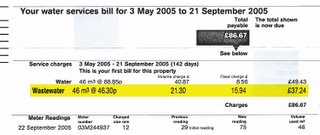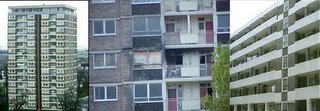
While everyone knows that they drive on the opposite side of the road here in Blighty, this only scratches the surface of a host of other incongruities and contradictions pertaining to the English way of life.
For instance, just yesterday I made the startling discovery--upon opening our Thames Water bill and recoiling in disbelief--that not only does one pay for water here, but one must also pay for the removal of the water, to the tune of nearly $70. I guess this falls under Newton's Law, "For every action, there is an equal and opposite reaction", but still, this discovery brought an all-new low point to my growing list of egregious things that "should-be-free but aren't" here in England. Heretofore, the list was topped by the annual TV license ($500) and the galling fact that you're charged 10 cents for a book of matches from the news agent (free in NY and possibly the rest of the civilized world.)
While mulling over the new indignity of paying for "waste water" during my walk to class the other night at City University, I started realizing what a land of opposites England truly is. The U. is located in a dodgy section of East London accessed by the beautifically titled "Angel" tube stop (alternately, across town there's a tube stop called Icksworth and while I haven't been over there, I bet it's downright lovely).
Walking down the forlorn street leading up to school, I passed the picturesquely titled "Arlington Estates", "Sutton Place Dwellings" and "Glendorn Garden Estates". Anywhere else, it might sound like I'd entered an exclusive gated community lined with posh McMansions, but these apartment blocks were government-owned low-income housing, a.k.a. council flats, which often go by the name of "Housing Estates", a moniker which belies with their frequently grim appearance:

Another subject of curiosity is the English sense of temperature, if indeed there is such a thing as they seem to have no consistent internal thermometer. These are people that wear wool scarves when it's sixty degrees out, yet perversely go coatless in a tube top in mid-winter and crank the roof down on their convertibles the moment the mercury rises past 40. Two days or more above 65 is considered a heat wave and may result in hordes of British people fainting at outdoor events.
Other incongruities that I still haven't managed to get to the bottom of yet are:
 1) Public schools are called "private" and private schools are called "public"
1) Public schools are called "private" and private schools are called "public"
2) On your birthday, YOU pay for your own--and everyone else's--drinks and dinners
3) If a burglar breaks into your home, you don't have the right to harm him in order to protect yourself, your family or your possessions and many burglars have in fact successfully sued homeowners. A victim can even go to jail even if he hits back "too hard" when attacked.
4) Despite being an insanely private society when it comes to money, homes, jobs and almost any mundane detail about their lives, the British have no problem opening up to perfect strangers on other more 'colorful' topics...For instance last Friday night at a pub I was privy to having a young man, possibly in a misguided attempt at flirting, tell me and a friend about his colonic earlier that day.
Frankly, it's no wonder that the English bemoan their loss of national identity--who wouldn't be schizophrenic in a society plagued by this much confusion and contradiction?
 Today is Guy Fawkes Day, this country's rough equivalent to our Fourth of July, though of course, this being England, it's necessary that the very nature of today's celebrations be wracked with a certain perversity and come couched in a cloud of uncertainty. In fact, rather than equating it to our Independence Day, a better analogy would be a cross between Halloween and if we were to celebrate, say, "Lee Harvey Oswald Day".
Today is Guy Fawkes Day, this country's rough equivalent to our Fourth of July, though of course, this being England, it's necessary that the very nature of today's celebrations be wracked with a certain perversity and come couched in a cloud of uncertainty. In fact, rather than equating it to our Independence Day, a better analogy would be a cross between Halloween and if we were to celebrate, say, "Lee Harvey Oswald Day".




